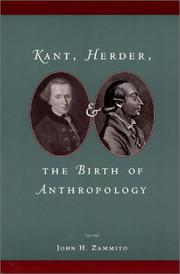| Listing 1 - 3 of 3 |
Sort by
|
Book
ISBN: 9780199659388 0199659389 Year: 2012 Publisher: Oxford : Oxford University Press,
Abstract | Keywords | Export | Availability | Bookmark
 Loading...
Loading...Choose an application
- Reference Manager
- EndNote
- RefWorks (Direct export to RefWorks)
Philosophy of language has for some time now been the very core of the discipline of philosophy. But where did it begin? Frege has sometimes been identified as its father, but in fact its origins lie much further back, in a tradition that arose in eighteenth-century Germany. Michael Forster explores that tradition. He also makes a case that the most important thinker within that tradition was J. G. Herder. It was Herder who established such fundamental principles in the philosophy of language as that thought essentially depends on language and that meaning consists in the usage of words. It was he who on that basis revolutionized the theory of interpretation ("hermeneutics") and the theory of translation. And it was he who played the pivotal role in founding such whole new disciplines concerned with language as anthropology and linguistics. In the course of developing these historical points, this book also shows that Herder and his tradition are in many ways superior to dominant trends in more recent philosophy of language: deeper in their principles and broader in their focus.
Language and languages --- Langage et langues --- Philosophy. --- Philosophie --- Herder, Johann Gottfried, --- Semantics --- Philosophy --- von Herder, Johann Gottfried, --- Language and languages - Philosophy --- von Herder, Johann Gottfried, - 1744-1803
Book
ISBN: 1108672582 1108639550 1108483070 1108716350 9781108716352 9781108483070 1108593224 Year: 2019 Publisher: Cambridge : Cambridge University Press,
Abstract | Keywords | Export | Availability | Bookmark
 Loading...
Loading...Choose an application
- Reference Manager
- EndNote
- RefWorks (Direct export to RefWorks)
In this book, Rachel Zuckert provides the first overarching account of Johann Gottfried Herder's complex aesthetic theory. She guides the reader through Herder's texts, showing how they relate to eighteenth- and nineteenth-century European philosophy of art, and focusing on two main concepts: aesthetic naturalism, the view that art is natural to and naturally valuable for human beings as organic, embodied beings, and - unusually for Herder's time - aesthetic pluralism, the view that aesthetic value takes many diverse and culturally varying forms. Zuckert argues that Herder's theory plays a pivotal role in the history of philosophical aesthetics, marking the transition from the eighteenth-century focus on aesthetic value as grounded in human nature to the nineteenth-century focus on art as socially significant and historically variable. Her study illuminates Herder's significance as an innovative thinker in aesthetics, and will interest a range of readers in philosophy of art and European thought.
Aesthetics. --- Beautiful, The --- Beauty --- Esthetics --- Taste (Aesthetics) --- Philosophy --- Art --- Criticism --- Literature --- Proportion --- Symmetry --- Psychology --- Herder, Johann Gottfried, --- von Herder, Johann Gottfried --- Von Herder, J. G. --- Radio broadcasting Aesthetics --- Aesthetics --- von Herder, Johann Gottfried, - 1744-1803 --- Esthétique. --- Esthétique.

ISBN: 9780226978598 0226978583 0226978591 9780226978581 Year: 2002 Publisher: Chicago (Ill.) : University of Chicago press,
Abstract | Keywords | Export | Availability | Bookmark
 Loading...
Loading...Choose an application
- Reference Manager
- EndNote
- RefWorks (Direct export to RefWorks)
If Kant had never made the "critical turn" of 1773, would he be worth more than a paragraph in the history of philosophy? Most scholars think not. But in this pioneering book, John H. Zammito challenges that view by revealing a precritical Kant who was immensely more influential than the one philosophers think they know. Zammito also reveals Kant's former student and latter-day rival, Johann Herder, to be a much more philosophically interesting thinker than is usually assumed and, in many important respects, historically as influential as Kant. Relying on previously unexamined sources, Zammito traces Kant's friendship with Herder as well as the personal tensions that destroyed their relationship. From this he shows how two very different philosophers emerged from the same beginnings and how, because of Herder's reformulation of Kant, anthropology was born out of philosophy. Shedding light on an overlooked period of philosophical development, this book is a major contribution to the history of philosophy and the social sciences, and especially to the history of anthropology.
Philosophical anthropology --- Herder, von, Johann Gottfried --- Kant, Immanuel --- History --- Kant, Immanuel, --- von Herder, Johann Gottfried, --- History. --- Herder, Johann Gottfried --- Kant, Emmanuel --- Kant, Emanuel --- Kant, Emanuele --- von Herder, Johann Gottfried --- Von Herder, J. G. --- Kant, I. --- Kānt, ʻAmmānūʼīl, --- Kant, Immanouel, --- Kant, Immanuil, --- Kʻantʻŭ, --- Kant, --- Kant, Emmanuel, --- Ḳanṭ, ʻImanuʼel, --- Kant, E., --- Kant, Emanuel, --- Cantơ, I., --- Kant, Emanuele, --- Kant, Im. --- קאנט --- קאנט, א. --- קאנט, עמנואל --- קאנט, עמנואל, --- קאנט, ע. --- קנט --- קנט, עמנואל --- קנט, עמנואל, --- كانت ، ايمانوئل --- كنت، إمانويل، --- カントイマニユエル, --- Kangde, --- 康德, --- Kanṭ, Īmānwīl, --- كانط، إيمانويل --- Kant, Manuel, --- Philosophical anthropology - History --- Kant, Immanuel, - 1724-1804 --- von Herder, Johann Gottfried, - 1744-1803
| Listing 1 - 3 of 3 |
Sort by
|

 Search
Search Feedback
Feedback About UniCat
About UniCat  Help
Help News
News